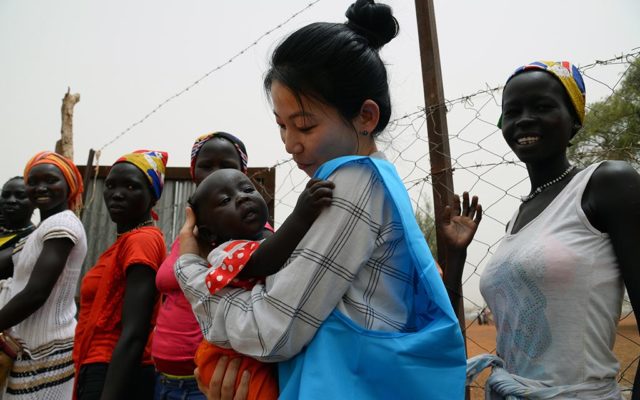We must not look away
CEO of UK for UNHCR, Emma Cherniavsky, calls for compassion and support following 100 days of conflict in Sudan
24.07.23
© UNHCR/Andrew McConnell
This week marks 100 days since fighting erupted in Sudan. The chaotic scenes we saw on the news have continued and a staggering 3.3 million people have been forced to flee their homes since April. That’s more than the entire population of Wales. Over 730,000 people have fled the country altogether, suddenly finding themselves to be refugees – a fate many could never have imagined just a few short months ago.
Last year, when the full-scale invasion of Ukraine began, here at UK for UNHCR our phone lines and inboxes were inundated with offers of support. We raised an astonishing £45 million as every sector of society rallied to stand with refugees. That generosity was a heartfelt response from individuals, communities and businesses around the UK who saw people in urgent need of help and wanted to do something. I spoke to one donor recently who summed up that response in these simple words. “If I was in that position, I hope someone would help me.”
We are now asking donors and supporters to help people from Sudan who, at this moment in time, need our compassion and solidarity. Whilst media attention may have waned, the conflict in Sudan continues to threaten the safety and survival of civilians across the country. After an urgent global appeal to the international community, UNHCR still has only 46% of the funds needed to support people fleeing this latest emergency.
Sudan’s neighbours open their borders to refugees
Despite some headlines we see in the UK, it is low and middle countries which host by far the most refugees around the world (more than 76%). Quite understandably, most refugees choose to stay close to home in neighbouring countries, in the hope they can return as soon as it is safe to. Sudan is no different.
Countries neighbouring Sudan have opened their borders and shown incredible generosity to people fleeing the violence. More than 730,000 women, children and men have fled Sudan since April, including 79,000 in the last week alone. The majority – more than half a million refugees – are being hosted across Chad and Egypt, while thousands more are given sanctuary by South Sudan, Ethiopia and Central African Republic. These countries are offering refuge and solidarity despite facing their own humanitarian crises.
Our colleagues in South Sudan have told us about some of the people arriving from Sudan, including Hasima Chol, 20, who arrived at the South Sudanese border crossing of Joda. Her 2-year-old daughter Nyatut Mamur was supported by UNHCR partners and found to be malnourished. Hasima is now able to take Nyatut to access health care services on the South Sudanese side.
Before the conflict, Sudan hosted over 1 million refugees
Sudan was already hosting 1.1 million refugees from neighbouring crises before this latest emergency. Across the country, 3.7 million of its own citizens were also internally displaced because of past conflict in country. Once again, displaced communities are fleeing for their lives.
My UNHCR colleagues have shared their concern over continued reports of civilians, including those already displaced from their homes, becoming indiscriminate casualties of the fighting, and being prevented from seeking safety. Just last month, we received the dreadful news that 28 refugees in Khartoum were killed and others were injured when their neighbourhood was engulfed by fighting.
Increasing reports of gender-based violence
The clashes between the Sudanese Armed Forces (SAF) and Rapid Support Forces (RSF), have resulted in over 1,000 deaths and over 11,700 injuries (as cited by OCHA). UN officials have voiced shock and condemnation at increasing reports of gender-based violence – including conflict-related sexual violence against internally displaced and refugee women and girls.
Gillian Triggs, UNHCR Assistant High Commissioner for Protection has also stressed that incidents of sexual violence, including rape, sexual assault, sexual exploitation and physical violence are reportedly perpetrated by fighters, criminals and smugglers against civilians in Khartoum and other areas, as well as those on the move. Although women and girls are disproportionately affected by sexual violence, boys and men are also reported to be among the survivors.
What can we in the UK do to help?
While the people of Sudan seek safety from this devastating conflict, I know that supporters across the UK stand ready to help and let the people of Sudan know they are not forgotten.
There are actions we can all take to help:
- Donate now – UNHCR’s work relies on donations. By supporting our emergency response, you enable UNHCR teams to continue to deliver assistance and protection for those forced to flee.
- Corporate partnership – Could your employer, networks, services or suppliers help our efforts? We would love to hear from you.
- Fundraise for refugees – Mobilise your community, such as workplace, friends, faith group or school, to hold a fundraising event or challenge.




